Recent Research Topics
Our laboratory is classified into computational intelligence field and
social sciences literature and studies emergent computational methodology
and artificial intelligence. Students are strongly encouraged to develop
a computer program which runs in some sense. Several graduates sometimes
participate our seminars for discussion and research in this laboratory
in the sense that our laboratory is a flexible research community. Finally,
we call it Gallery for Evolutionary computation and Artificial intelligence
Researches (GEAR).
"Realization of a system of logical based, practical value, and general use" is our motto.
This is not so easy. However, there are a vast variety of applied research which requires artificial intelligence and,
at the same time, lots of theories on artificial intelligence are expected to be applied.
Therefore, the research themes we may grapple with will be inexhaustible.
Our current research interests are classified into the following four groups:
Fields
You can know our researches about various social phenomena and experiential learning from this page.
To get more details about researches in Terano Lab., please check here too.
Agent Based Simulation (ABS)
To investigate phenomena observed in real societies and economies by applying simulation techniques to socio-economic systems.
To put it concretely, we firstly treat societies, organizations, and individuals as agents,
and then analyze the processes of how a system is generated from the bottom-up, namely interactions of agents,
and the characteristics of its structure.
Recently, we are also studying large-scaled agent-based simulation
in cooperation with Dr. Yamamoto.
Evolutionary computation
To study problem solving and learning in multi-agent simulations from the standpoint of organizational sciences including data analysis in multi-agent systems, knowledge management in organizations, and application to CAD systems.
ex.) Multi-Agent Learning Approach to Dynamic Security Patrol Routing
Please read Irvan's page: Irvan's page
Intelligent systems
To discover hidden patterns and laws of various data and help establish knowledge management and prediction methods using artificial intelligence such as machine learning and text mining. At the same time, we apply obtained results to social simulations.
In addition, we study Human Computer Interaction and Computer Support for Collaborative Learning from the perspective of "universal design" and "inclusion" to achieve normalized societies.
Recently, we are also studying recommendation algorithms.
We analyze the big data about the action of users and then develop novel algorithms
and systems to recommend items which fitted the users' personality and preferences.
The recommendation algorithms and systems are indispensable for WEB service.
ex.) Recommender Systems Based on Doubly Structural Network
Recommendation algorithms based on doubly structural network
 In most recommender systems, there are main two entities: user and items, and three relationships: users’ relationship, item’s connection and user-item like/dislike relationship. Hence, it’s reasonable to incorporate the entities and relationships into one model ------ doubly structural network. Based on this model, my current research is developing recommendation algorithms by incorporating relevant theories such social influence theory, social impact theory and so on.
In most recommender systems, there are main two entities: user and items, and three relationships: users’ relationship, item’s connection and user-item like/dislike relationship. Hence, it’s reasonable to incorporate the entities and relationships into one model ------ doubly structural network. Based on this model, my current research is developing recommendation algorithms by incorporating relevant theories such social influence theory, social impact theory and so on.
TV program recommendation framework and algorithms
TV program recommender system is one important topic and application of recommender systems. My research about TV program recommender systems are based on the concept of smart TV which is the integration of internet and Web 2.0 features into television sets and set-top boxes. The goal of the research is to propose a smart, open and novel TV program recommendation framework and develop corresponding algorithms for it.
Consumer adoption of recommender systems
With the development of E-commerce, consumer adoption of recommender systems is very important for designer and developer of recommender systems. In my research, I aim at developing an integrated model, which demonstrates what factors influence consumers’ what kind of perceptions to recommender systems and eventually lead to what kind of behaviors to recommender systems, and verifying it by user study.
Papers
- Na Chang, Takao Terano: Recommender Systems Based on Doubly Structural Network. Proc. ICIM 2011(8th Int. Confe on Innovation & Management), pp. 975-981, 2011.
Service sciences
To investigate service industries, which is hard to quantify in social and economic activities, by engineering approach. For this purpose, we identify distinctions and limits of corresponding issues on-site and then try to find a solution.
Elaboration and practice of learning theories
Recent investigations have demonstrated that experiential learning and collaborative learning are important from children to adults. We are developing 1)a English composition method using peer review, 2) a business case method using MANGA case textbook, 3) a case-oriented game for learning business, and 4) evaluation methods of case method and business game.
Pictogram Network to Support English Composition Instructors
Under construction...
Making a Complex MANGA Case for Learning in Practice: Embedding Awareness
Under construction...
We are studying this theme in cooperation with Dr. Yoshikawa.
Learning System Toward Integration of Case Method and Business Gaming
Under construction...
Evaluation Methods of Case Method and Business Game
Under construction...
Papers
- Sayuri Yoshizawa-Watanabe, Masaaki Kunigami, Satoshi Takahashi, Atsushi Yoshikawa, Takao Terano: "Pictogram Network to Support English Composition Instructors". Proc. 34th Annual Cognitive Science Conference, Poster session 3-160, 2012.
- Sayuri Yoshizawa, Takao Terano, Atsushi Yoshikawa: Assessing the Impact of Student Peer Review in Writing Instruction by Using the Normalized Compression Distance. IEEE Transactions on Professional Communication, 10.1109/TPC.2011.2172833, Vol. 55, No. 1, pp. 85-96, 2012.
- Akiko ORITA, Atsushi YOSHIKAWA and Takao TERANO "Making a Complex MANGA case for Learning in Practice: Embedding Awareness, Experience and Knowledge in the Description" Proceedings of IADIS CELDA2010, pp. 326-327
- Nakano, K., Matsuyama, S., Terano, T.: Research on a Learning System Toward Integration of Case Method and Business Gaming. in Terano, T., Kita, H., Deguchi, H., Kijima, K. (eds.): Agent-Based Approches in Economic and Social Complex SYstems IV - Post-Proceedings of the AESCS International Workshop 2005-, pp. 21-32, Springer Verlag, 2007.
- O. KOSHIYAMA, A. YOSHIKAWA, T. TERANO: "Analyzing Learners' Behaviors in a Business Gaming Practice", Proceedings of 16th International Conference on Computers in Education, pp.381-386 (2008)
- Hikaru Uchida, Akiko Orita , Masaaki Kunigami, Atsushi Yoshikawa, Takao Terano: "Persona Conjoint Method: Measuring Learners' Latent Understandings and the Effect of Stereotypes in Complex Business Situations", Grace Hopper Celebration of Women in Computing (GHC 2012) (Oct. 2012), Baltimore, Maryland, USA [Poster]
Application (from Recent Research)
We list current and representative research topics in the following:
A Unified Agent-Based Model to Analyze Organizational Deviation and Kaizen Activities
Under construction...
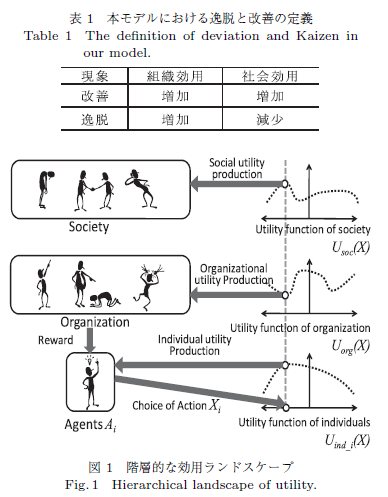
Papers
- Tomomi Kobayashi, Satoshi Takahashi, Masayuki Kunigami, Atsushi Yoshikawa, Takao Terano: A Unified Agent-Based Model to Analyze Organizational Deviation and Kaizen Activities. in Francien Dechesne, Hiromitsu Hattori, Adriaan ter Mors, Jose Miguel Such, Danny Weyns, Frank Dignum (Eds.): Advanced Agent Technology -Proc. AAMAS 2011 Workshops-, LNAI 7068, Springer Verlag, pp. 384-395, 2012.
- Takao Terano, Tomomi Kobayashi, Satoshi Takahashi: Is This a Good Service? - Analyzing Service Levels of Individuals and Organizations through Agent-Based Modeling. 2012 Frontier in Service Conference, Session # 269, 2012.
Development of Agent-Based In-Store Simulator to Analyze Pedestrian Behaviors
Under construction...
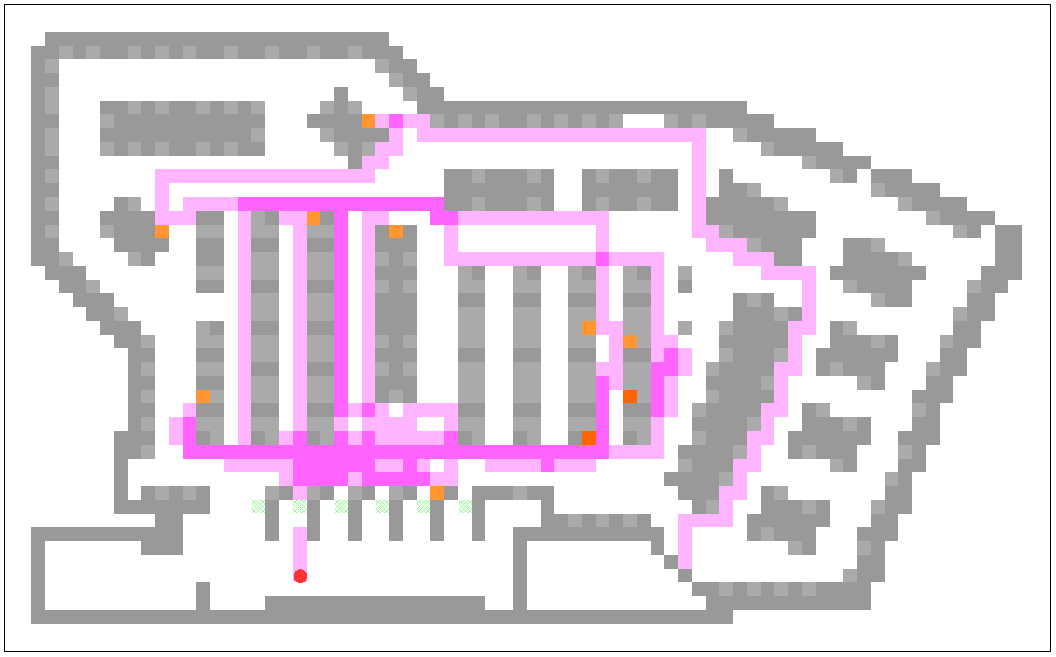
Papers
- Terano, T., Kishimoto A., Takahashi, T., "Investigating Retail Sales Operations Through Agent-Based In-Store Simulator," 2009 Frontiers in Service Conference, C-2-3, p. 30, Oct. 29-Nov.1, Honolulu, 2009.
- Kitazawa, M., Takahashi, M., Yamada, T., Yoshikawa, A., Terano, T.: How Do Customers Move in a Supermarket? -Analysis by Real Observation and Agent Simulation-. Proc. the 3rd Japan-China Joint Symposium on Information Systems, 2010, pp. 23-26, 2010.
- Sato, F., Kitazawa, M., Yoshikawa, A., Terano, T., "Development of Agent-Based In-Store Simulator to Analyze Pedestrian Behaviors," The 4th Japan-China Joint Symposium on Information Systems (JCIS 2011), Nanchang, Jiangxi, China, pp. 31-34, April 14-16, 2011.
Family Strategies in Civil Service Examination in Imperial China
Under construction...
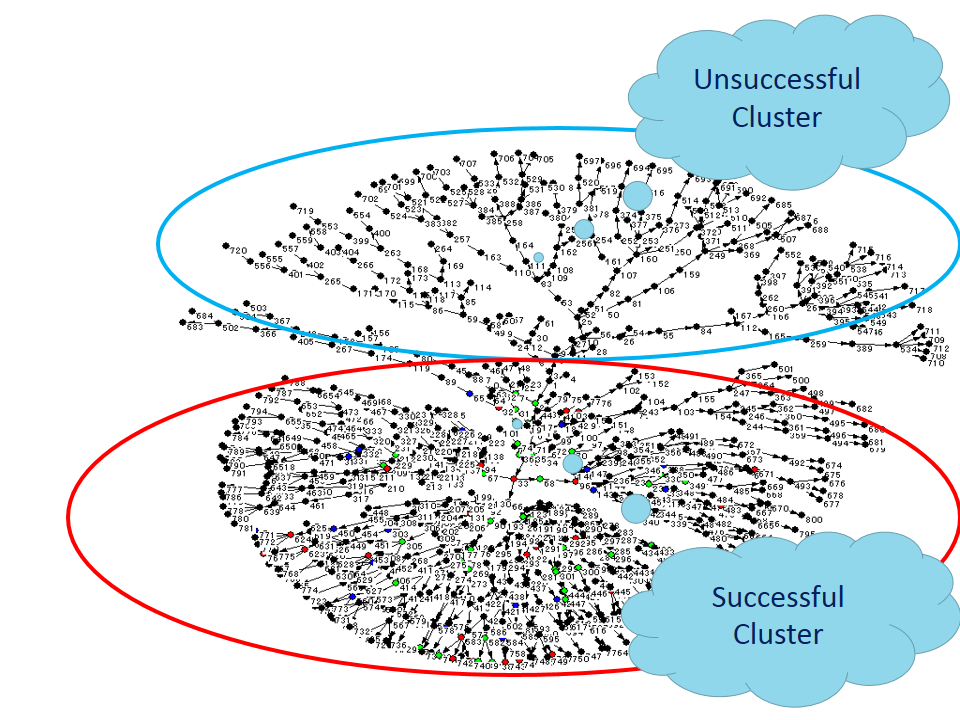
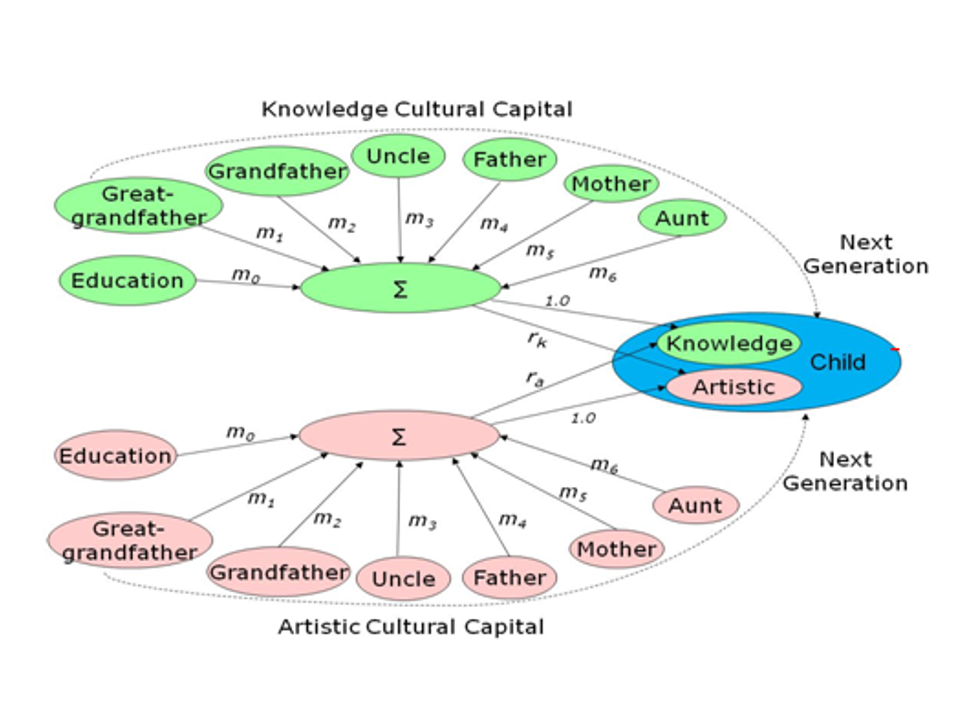
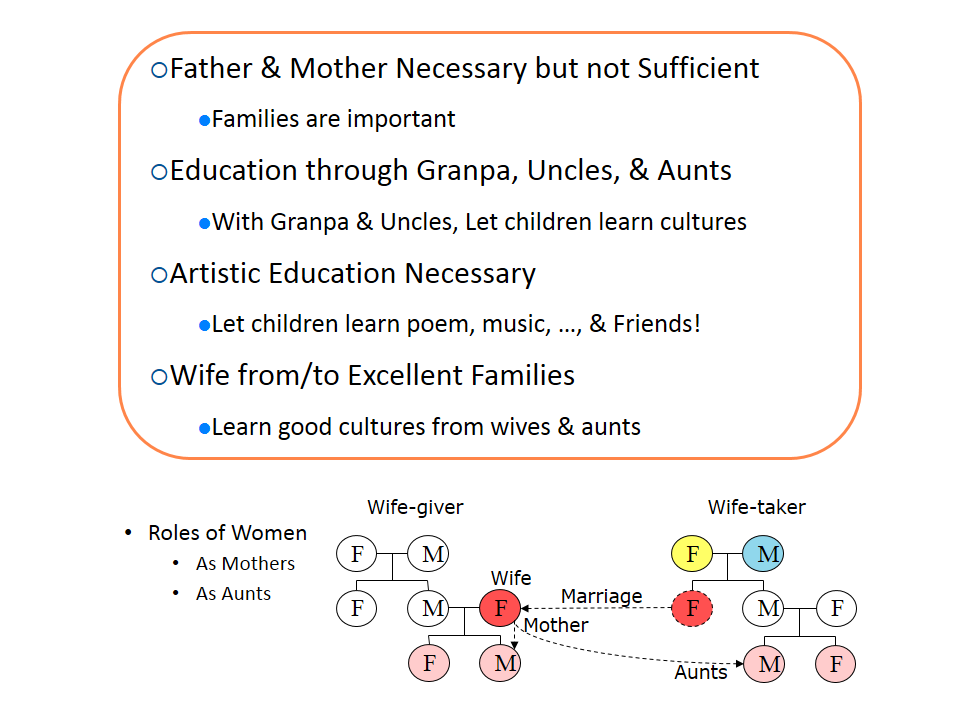
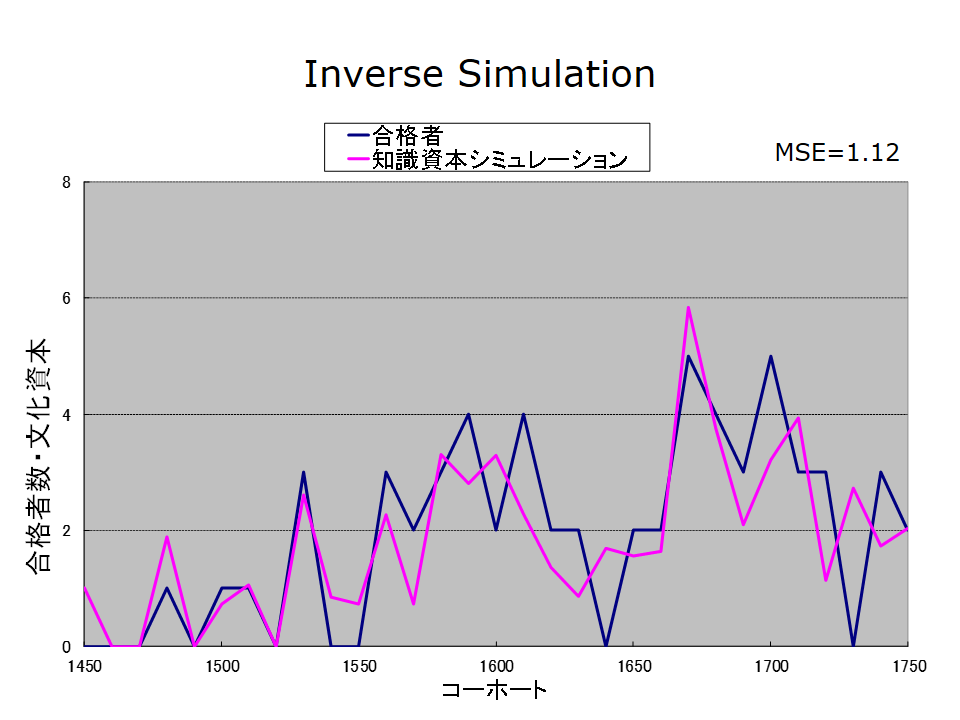
Elucidation of thesecret to succeed in Chinese higher civil service examinations
Under construction...
"Inverse Simulation" technique
In this study, we investigate what would happen in a Chinese historical family line. We have analyzed a particular family line which had a great many candidates who passed the very tough examinations for Chinese government officials over 500 years. First, we studied the genealogical records Zokufu in China. Second, based on the study, we implemented an agent-based model with the family line network as an adjacency matrix, and the personal profile data as an attribution matrix. Third, using the "inverse simulation" technique, we optimized the agent-based model in order to fit the simulation profiles to the real profile data. From the intensive experiments, we have found that both grandfather and mother have a profound impact within a family in (1) transmitting cultural capital to the children, and (2) maintaining the norm system of the family. We conclude that advanced agent-based models are able to contribute to the discovery of new knowledge in the fields of historical science.
Papers
- Chao Yang, Setsuya Kurahashi, Keiko Kurahashi, Isao Ono, Takao Terano, "Agent-Based Simulation on Women's Role in a Family Line on Civil Service Examination in Chinese History", Journal of Artificial Societies and Social Simulation, vol. 12, no. 25, 2009
- Setsuya Kurahashi, Takao Terano: Historical Simulation: A Study of Civil Service Examinations, The Family Line and Cultural Capital in China. Advances in Complex Systems (ACS) ,Vol.11, No. 2, pp. 187-198 (April 2008)
A Doubly Structural Network Method and Analysis on the Emergence of Money
Under construction...
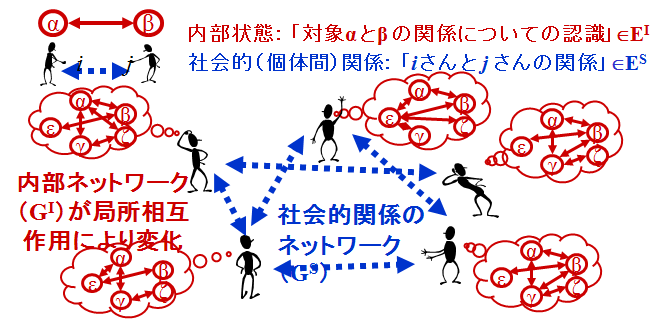

Under construction...
Papers
- Masaaki Kunigami, Masato Kobayashi, Satoru Yamadera, Takashi Yamada, Takao Terano: A Doubly Structural Network Method and Analysis on the Emergence of Money. in K. Takadama, C. Cioffi-Revilla, G. Deffuant (eds.): Simulating Interacting Agents and Social Phenomena, The Second World Congress, Springer, 2010.
- Masaaki KUNIGAMI, Masato KOBAYASHI, Satoru YAMADERA, Takashi YAMADA, Takao TERANO,"A Doubly Structural Network Model: Bifurcation Analysis on the Emergence of Money", Evolutionary and Institutional Economics Review, Vol.7 No.1, pp.65-85, 2010. [J-STAGE]
